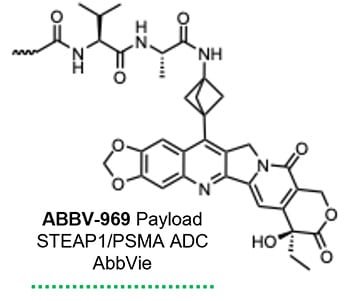For the eighth straight year, the New Drugs on the Horizon program unveiled novel cancer agents that are either in early-stage trials or on the verge of entering the clinic. Organized by the AACR Chemistry in Cancer Research (CICR) Working Group, the three sessions at the AACR Annual Meeting 2025 shared first disclosures of 12 cutting-edge strategies representing a variety of treatment modalities, including KRAS inhibitors, bispecific T-cell engagers, a tumor-targeting antibody-drug conjugate that delivers radionuclides, and a first-in-class dual-targeting approach in prostate cancer.
ABBV-969: First-in-class Dual-targeting Antibody-drug Conjugate in Prostate Cancer
Regina M. Reilly, PhD, of AbbVie, shared data on ABBV-969, a first-in-class antibody-drug conjugate designed to target two antigens that are often overexpressed in metastatic castration-resistant prostate cancer (mCRPC): prostate-specific membrane antigen (PSMA) and six-transmembrane epithelial antigen of prostate 1 (STEAP1).
“These two antigens … are both clinical assets, so they have been validated,” said Reilly, who added that “about 80% of metastatic castration-resistant prostate cancer overexpresses STEAP-1 and that number rises to 90% for PSMA.”
Based on data from preclinical primate studies, the drug is now being tested in a phase I study in patients with mCRPC.
ABP-102/CT-P72: Bispecific T-cell Engager in HER2-expressing Cancers
Adam Pelzek, PhD, of Abpro, explored the science of ABP-102/CT-P72, a bispecific T-cell engager that targets the tumor-associated HER2 antigen and the T-cell receptor-related CD3 complex, and is designed to promote T-cell activation only in the presence of HER2-overexpressing cancer cells. In xenograft studies involving HER2-positive tumors and human immune cell supplementation, ABP-102/CT-P72 controlled the growth of both HER2-overexpressing tumors—demonstrating two-fold improved tumor control compared to a biosimilar HER2 x CD3 bispecific antibody—as well as HER2-low tumors. The therapy also had low off-target toxicity in monkeys, paving the way for trials in patients.
AMG 410: Pan-KRAS Inhibitor in Pancreatic Cancer
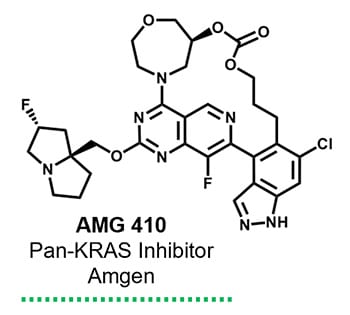
Brian A. Lanman, PhD, of Amgen, provided insights into AMG 410, a small molecule inhibitor of the KRAS signaling pathway that is often mutated in a variety of cancer types and represents a promising target, especially in pancreatic cancer. As a pan-KRAS inhibitor, it is designed to target different KRAS mutations and amplifications, but not HRAS or NRAS.
“The pan-KRAS binding profile points to the potential for it to serve as an effective inhibitor across diverse oncogenic KRAS mutants,” said Lanman, who estimated that pan-KRAS inhibitors could potentially benefit around 140,000 patients per year.
AMG 410 showed promise alone and in combination with inhibitors of the EGFR pathway and PD-1 immune checkpoint in pancreatic xenograft models, and it now has an Investigational New Drug (IND) application and a planned clinical trial.
AZD0022: KRAS G12D Inhibitor in Pancreatic, Colorectal, and Lung Cancers
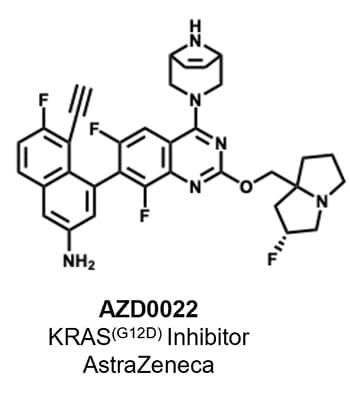
Carla P. Martins, PhD, of AstraZeneca, discussed the details of AZD0022, a small molecule KRAS inhibitor that targets both the activated and resting form of mutant KRAS G12D. AZD0022 displayed broad anticancer activity and sustained regression in KRAS G12D xenograft models, both cell line- and patient-derived, across multiple cancer types, and led to sustained regressions when combined with EGFR antibody therapy. The drug is now being tested as monotherapy and in combination with EGFR inhibition in patients with pancreatic, colorectal, and non-small cell lung cancers in the phase I/IIa ALAFOSS-01 trial.
In addition to the New Drugs on the Horizon session, a poster shared more insights into the pharmacokinetics and pharmacodynamics of AZD0022, focusing on preclinical studies in mice and dogs that helped the team better understand how the drug accumulates in the blood and within tumors over time.
BAY 3547926: Antibody-based Radionuclide in Liver Cancer
Jenny Karlsson, PhD, of Bayer, brought attention to BAY 3547926, an antibody-based radionuclide therapy that targets glypican-3 (GPC3)-positive liver cancer cells and delivers alpha radiation-emitting Actinium-225. BAY 3547926 caused DNA double-strand breaks, selectively killing GPC3-positive hepatocellular carcinoma cells in vitro, and accumulated in xenograft tumors, curtailing their growth while clearing quickly from normal organs. Furthermore, the alpha-emissions localized with GPC3, caused tumor DNA damage, reduced serum alpha-fetoprotein levels, and achieved complete regression in an orthotopic model. Based on these promising findings, BAY 3547926 is now being tested in the phase I BANTAM-01 trial in patients with advanced hepatocellular carcinoma.
BMS-986449: Immunomodulatory Transcription Factor Degrader in Solid Cancers
Aaron Balog, PhD, of Bristol Myers Squibb, discussed BMS-986449, a small molecule that selectively degrades transcription factors Helios (IKZF2) and Eos (IKZF4) to reprogram immunosuppressive regulatory T cells and promote effector activity. A phase I trial is evaluating BMS-986449 both alone and in combination with the anti-PD-1 inhibitor nivolumab (Opdivo) in patients with advanced solid cancers.
“The hypothesis was that if we could degrade Helios and Eos, it would have the potential to repolarize [regulatory T cells] and turn them into more effector-like T cells,” said Balog.
A poster provided further information on the preclinical foundation supporting the druggability of Helios and the clinical development of BMS-986449 through genetic loss studies and a molecular degradation approach that clarified the roles of Helios and Eos as “critical nodes in a transcriptional network that enforces a stable immunosuppressive [regulatory T cell] phenotype.”
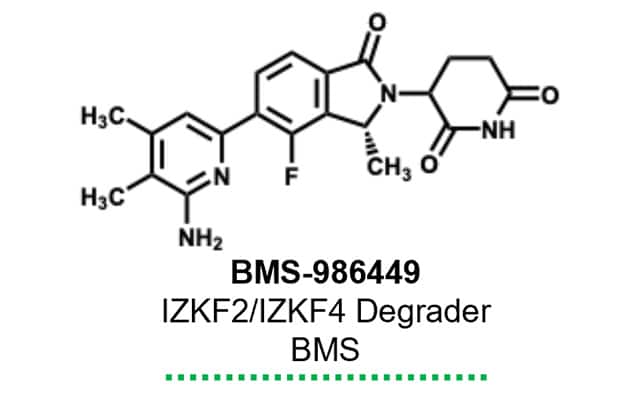
FXX489: Stromal-targeting Radioligand in Breast, Colorectal, Lung, and Pancreatic Cancers
Alexei Karpov, PhD, and Markus Reschke, PhD, both from Novartis, took turns talking about the properties of FXX489, a radioligand therapy that targets fibroblast activation protein (FAP). In translationally relevant cancer type models with FAP-expressing fibroblasts, the therapy exhibited improved tumor retention and impressive antitumor activity, and a phase I trial is now testing FXX489 in patients with breast, colorectal, lung, and pancreatic cancers.
A poster offered an overview of the first-in-human phase I trial of FXX489, which involves dose escalation and expansion parts, with information about eligibility criteria, dosing schedules, clinical endpoints, and more.
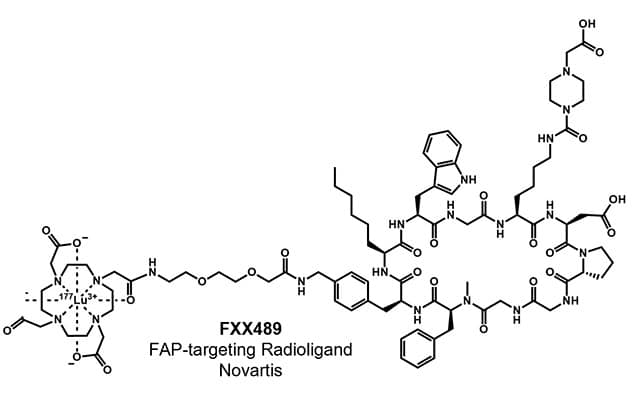
GDC-2992: Bifunctional Androgen Receptor Inhibitor in Prostate Cancer
Ciara Metcalfe, PhD, of Genentech, presented studies of GDC-2992, a bifunctional, dual inhibitor of both the wild-type and mutant forms of the androgen receptor that is often expressed aberrantly in prostate cancer. GDC-2992 led to tumor regression and reduction of prostate-specific antigen (PSA) levels preclinically, and it is now in a phase I study in patients with advanced or metastatic prostate cancer.
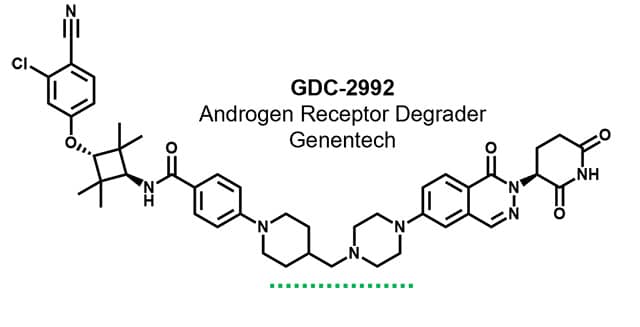
GSK4418959 (IDE275): WRN Helicase Inhibitor in Cancers with High Microsatellite Instability
Yanhua Rao, PhD, of GSK, unveiled insights into GSK4418959 (IDE275), a Werner (WRN) helicase inhibitor that binds WRN reversibly and demonstrated the ability to induce DNA damage in solid tumors with high microsatellite instability, while sparing microsatellite stable cells.
“GSK4418959, or IDE275, is a novel WRN helicase inhibitor with a unique mode of interaction … and the ability to overcome the resistance [to] other WRN inhibitors,” said Rao.
The treatment halted proliferation in diverse MSI-H cell lines and organoids, and drove durable tumor regressions in multiple MSI-H cell line- and patient-derived xenograft models, including colorectal tumors from one patient whose disease was refractory to PD-1 blockade and another whose was refractory to the WRN inhibitor RO7589831, which was featured during a Clinical Trials Plenary Session.

M0324: Agonist Immunomodulator in MUC1-expressing Cancers
Weixiao Sha, PhD, of Merck, focused on findings involving M0324, an antibody-based construct designed to activate the CD40 immune signaling pathway, but only in the presence of high MUC1 levels in the vicinity.
“It is hard to illustrate how the molecule really works as a MUC1-conditional CD40 agonist, especially if antibody-protein interactions occur in three dimensions,” said Sha, who noted that “you require a trimer for CD40 to actually have signaling.”
M0324 outperformed other anti-CD40 antibodies in clinical testing, boosting IL-12p40 when dendritic cells were in the presence of tumor cells, and a single dose led to tumor elimination and high cure rates in MUC1-expressing mouse models of pancreatic and colorectal cancer.
RMC-5127: KRAS G12V Inhibitor
Anne Edwards, PhD, of Revolution Medicines, shared data on RMC-5127, a KRAS inhibitor that selectively targets the activated form of mutant KRAS G12V. In both cell line- and patient-derived xenograft models, the small molecule drug achieved deep and durable tumor regressions, and a first-in-human trial is on the horizon.
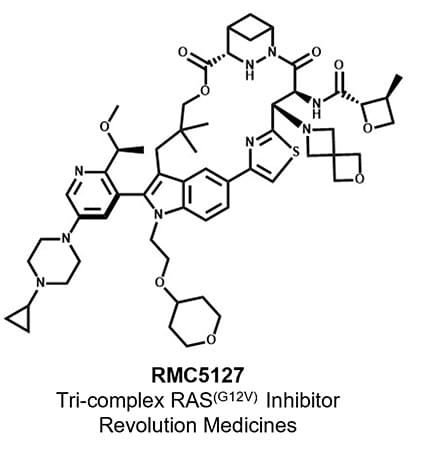
RO7567132: Bispecific Stromal- and Vasculature-targeting Therapy in Breast Cancer
Meher Majety, PhD, of Roche, recapped preclinical efforts involving RO7567132, a bispecific antibody designed to target FAP and lymphotoxin beta receptor (LTBR), which is expressed on a variety of cells in the microenvironment and the vasculature, and sensitize tumors to immunotherapy. In mice, RO7567132 turned immunologically “cold” breast cancers “hot” and improved responses to immune checkpoint and T-cell engager therapies, and a phase I trial is evaluating a combination with atezolizumab (Tecentriq).
All of the posters, New Drugs on the Horizon, and Clinical Trial Plenary sessions mentioned from the AACR Annual Meeting 2025 can be viewed on the virtual platform by registered attendees through October 2025.

